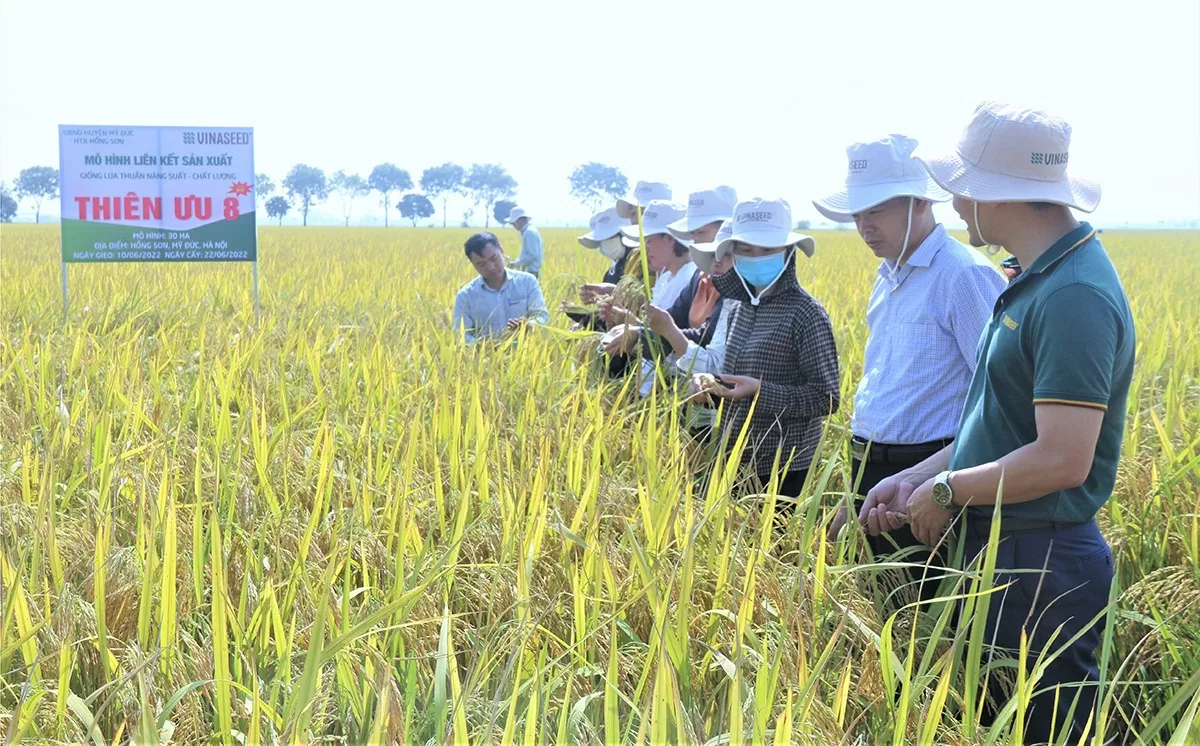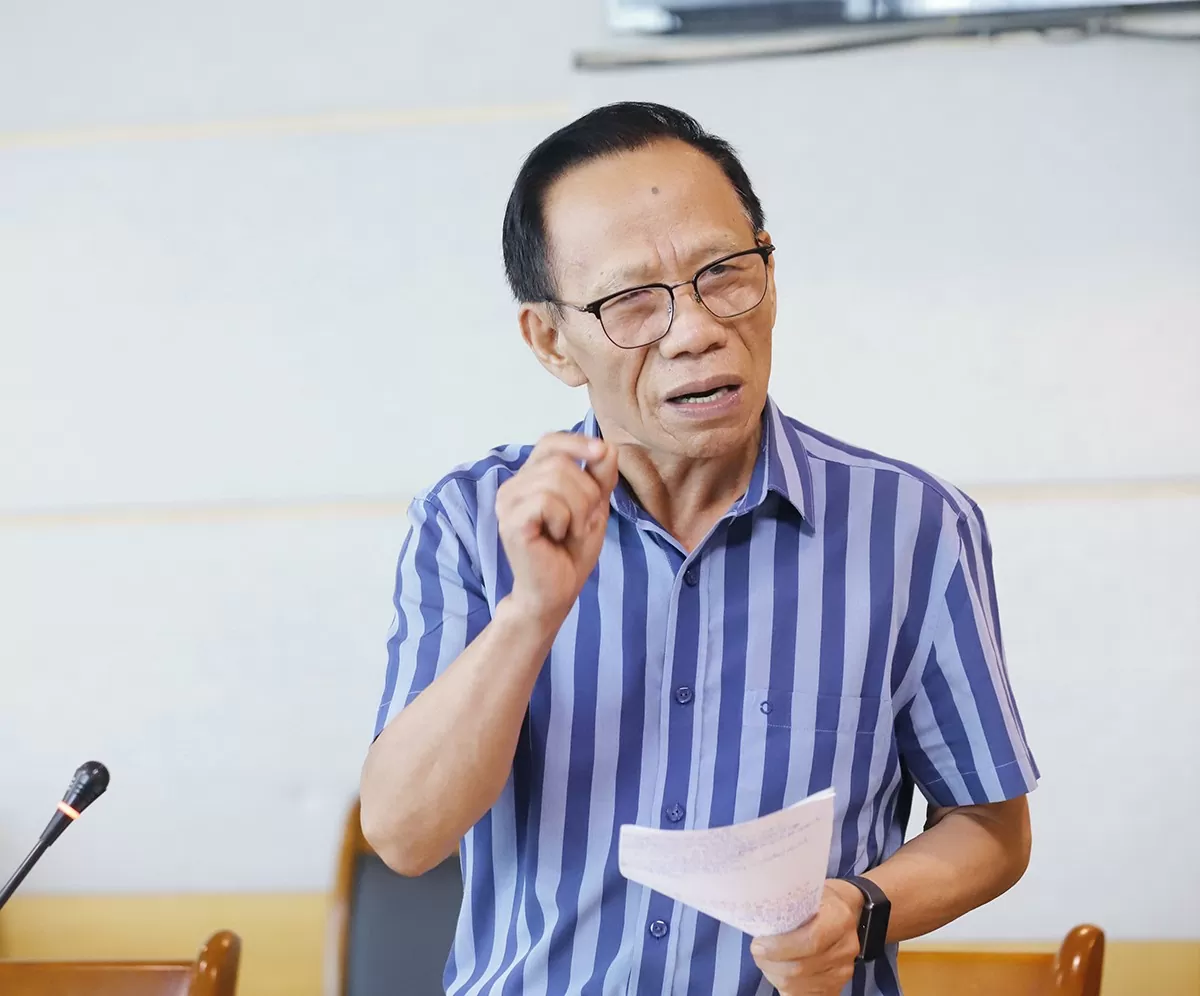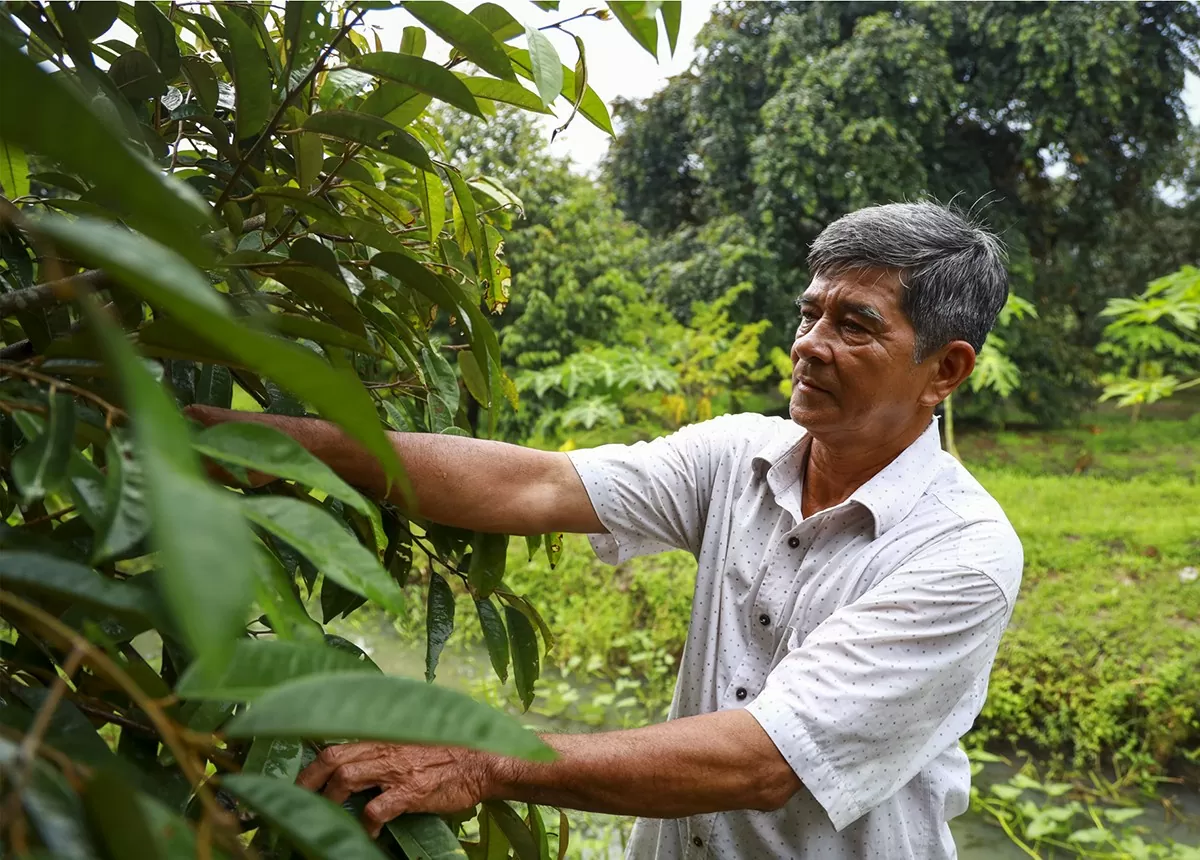If a 5% VAT is applied to fertilizers, farmers will be the ones to suffer. However, it's not just about the gains and losses, but about balancing interests.
Agricultural expert Hoang Trong Thuy had a discussion with a reporter from the Industry and Trade Newspaper about this issue.
As someone deeply involved with agriculture, farmers, and rural areas, how do you assess the issue of value-added tax on fertilizers?
To answer this question, let's look at the history of VAT on fertilizers, which was first regulated in 1997 with a tax rate of 5%. By 2014, due to economic changes and to boost production, distribution, and agriculture, the National Assembly decided not to apply VAT to this product.
 |
| For agriculture, sustainable development means investing in the most vulnerable areas: land, water, and farmers. (Photo: NH) |
The decision, effective from January 2015, brought joy to farmers, leading to bumper harvests and agricultural growth. Clearly, the policy yielded immediate results. However, shortly afterward, the agricultural market encountered several problems. Fertilizer businesses faced an additional burden because input materials were taxed but not deductible from output prices, thus adding to the product price. Ultimately, the farmers were the ones who suffered, having to buy fertilizers at higher prices.
When the policy of exempting fertilizers from VAT came into effect, there were approximately 7,900 businesses nationwide at that time. Many of them struggled, resorted to circumventing the law, raising prices, and some even produced counterfeit or substandard fertilizers. In addition, numerous newly established businesses engaged in the fraudulent trading of VAT invoices, further complicating the fertilizer market.
Regarding the market, since fertilizers were exempted from VAT, data from the Vietnam Fertilizer Association shows that total import volume has fluctuated between 3.3 and 5.6 million tons per year; import value ranges from 952 million to 1.6 billion USD per year, while total domestic production capacity has increasingly shrunk from 3.5 million tons per year (before 2014) to only 380,000 tons per year (from 2015).
 |
| Agricultural expert Hoang Trong Thuy. (Photo: Nguyen Chuong) |
During this period, the Ministry of Industry and Trade reported that, on average, market management forces detected and handled approximately 3,000 cases related to smuggled and counterfeit fertilizers annually. According to expert calculations, counterfeit fertilizers cause an average loss of $200 per hectare, resulting in an annual loss of up to $2.6 billion for the agricultural sector.
The tax exemption for fertilizers has led to a contraction of domestic production, resulting in a massive influx of imported goods into Vietnam due to more favorable competitive conditions. Ultimately, farmers still have to buy imported fertilizers at high prices, and the preference for "foreign goods" further increases the competitive advantage of imported fertilizers over domestically produced fertilizers.
Thus, while farmers are pleased that fertilizers are not subject to VAT, leading to lower prices, they are also suffering losses due to the chaos in the fertilizer market.
Currently, in the National Assembly and across various forums, there are many conflicting opinions regarding the imposition of a 5% VAT on fertilizers. What is your view on this matter?
Returning to the discussion about revising the tax rate on fertilizers, we're still debating who benefits and who loses. However, I believe the key here is to harmonize interests.
In my opinion, the story about imposing a 5% VAT on fertilizers or whether fertilizers are VAT-exempt is simply a transfer of the 'pain' of businesses to the 'pain' of farmers and vice versa.
No matter how we argue, it's clear that imposing a 5% VAT on fertilizers will ultimately harm farmers. Let's not beat around the bush, because when the authorities impose the tax, farmers will have to spend more money on fertilizers.
The question is, what can we do to alleviate farmers' suffering? My view is that we need to reinstate regulation, and at the same time, the State needs to stabilize prices.
What is the basis for regulating farmers and agriculture, sir?
Firstly , among the four roles of VAT, one is to regulate income for individuals and organizations consuming goods and services. Farmers, as the final consumers, must pay taxes according to the law, because clearly, fertilizers help crops increase productivity. Farmers participate in the market by bringing their products to market, so they must pay taxes.
Secondly , in principle, the scope of regulation is broad. Farmers are the users of fertilizers, so naturally they should be the beneficiaries of this regulation. This helps alleviate farmers' concerns.
Thirdly , agriculture is a "measure" of a nation's sustainability. For agriculture and businesses to develop sustainably, state regulation must be sufficiently large and sustainable. Meanwhile, fertilizers, while increasing productivity, are also a major contributor to soil pollution and greenhouse gas emissions.
 |
| Mr. Tran Van Chien – Director of Truong Khuong A Fruit Tree Cooperative – tends to his sapodilla orchard. (Photo by Nguyen Chuong) |
"High mountains must have land beneath them." For agriculture, sustainable development requires investment in the lowest areas: land, water, and farmers. Clearly, if we don't invest in the lowest areas, we can't talk about reaching the top. Therefore, we need to view agriculture with a sufficiently deep sense of 'love'.
I agree with the view of imposing a 5% VAT on fertilizers. However, I believe the government must commit to adjusting the tax rate back to at least approximately or equal to 5% to ensure sustainable agricultural development.
The question is, how can we regulate this? I believe we can focus on the following four things. First , soil improvement, because soil is the health of plants. However, this has not received sufficient attention in the past. The Ministry of Agriculture blames the Ministry of Natural Resources and Environment, and vice versa, leading to soil improvement being the weakest link in agricultural production resources.
Secondly , support should be provided to farmers and cooperatives using organic fertilizers. Farmers' associations in Ninh Binh, Nghe An, and other provinces are implementing many programs using organic fertilizers. This helps improve soil quality, ensure plant health, and utilize the ecosystem benefits from FTAs to boost exports and create momentum for regional agricultural products.
Thirdly , support for the training and education of farmers.
Fourth , support for green production and green growth at the regional level to reduce greenhouse gas emissions.
According to market principles, when agriculture grows by 1%, we must reinvest 4% to ensure balance; otherwise, we will be harming the environment. Vietnamese agriculture has grown by an average of 3.5-3.8% over the past 10 years. Therefore, we should reinvest 12-15.2% in agriculture. However, in reality, for many years, state investment in agriculture has only reached 8.8%, thus only meeting two-thirds of the needs, with farmers having to bear the rest themselves. This is what the state owes the farmers. Without proper investment, the environment will be destroyed.
Looking at Japan, with only 2 million farmers and agricultural growth of just 1.6%, they reinvest seven times that amount back into agriculture. Agriculture must be recognized as a benchmark; for sustainable agricultural development, state regulation must be substantial and sustained.
Therefore, I also recommend that the drafting agency continue to survey and clarify the scientific basis and impact of the policy to ensure a harmonious balance of interests. The 5% VAT rate is a long-term guarantee for agricultural development, but it is essential to regulate budget revenue to benefit farmers, so that the policy is not just a "fruit" that can only be smelled without any practical impact.
Thank you, sir!
Agricultural expert Hoang Trong Thuy: Policies are not like a sudden downpour that benefits everyone; some areas receive the benefits, others don't. It's unacceptable to be extreme in protecting one economic sector without a scientific basis, so balancing interests is paramount. This is especially true when fertilizers account for a particularly large proportion of farming and have a significant impact on the agricultural production value chain. |
VAT on fertilizers: Final part - Voices stemming from reality
Source: https://congthuong.vn/thue-vat-voi-mat-hang-phan-bon-bai-3-can-hai-hoa-loi-ich-358006.html








![[Photo] Prime Minister Pham Minh Chinh presides over a meeting to assess the situation during the Lunar New Year holiday.](https://vphoto.vietnam.vn/thumb/1200x675/vietnam/resource/IMAGE/2026/02/22/1771768925196_ndo_br_dsc-6283-jpg.webp)













































































































Comment (0)